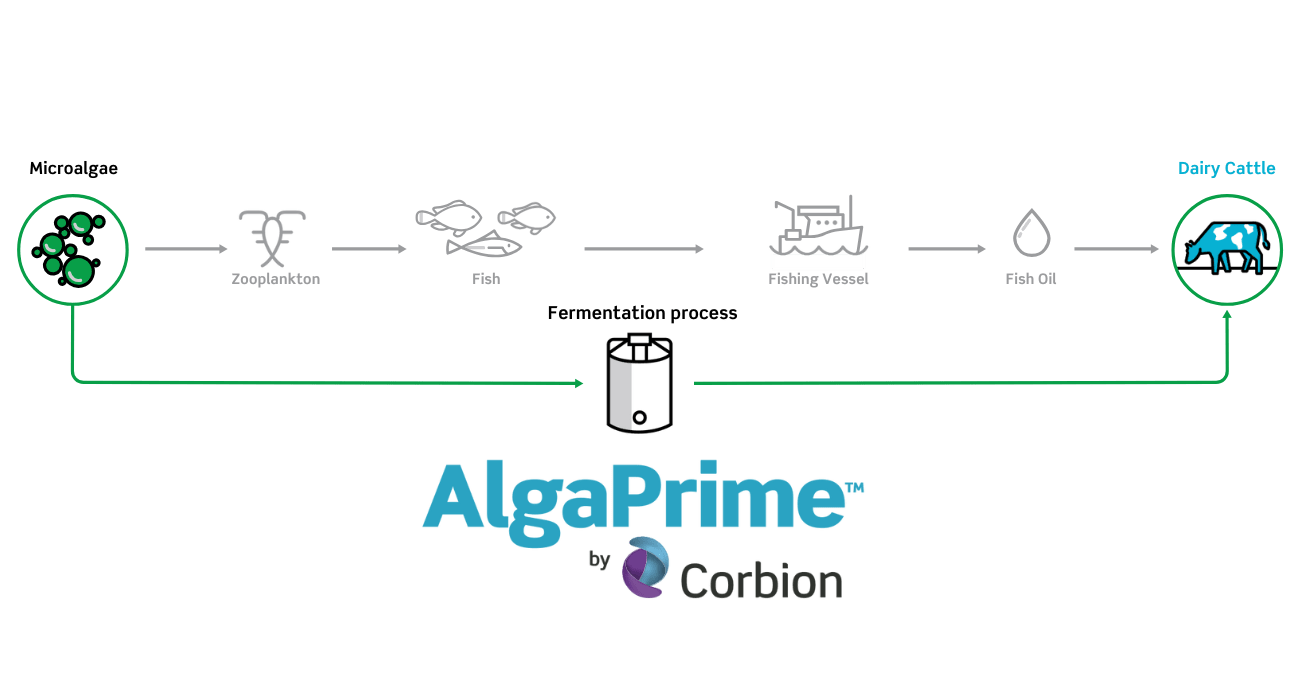The power of omega-3s
Long-chain polyunsaturated omega-3 fatty acids are essential nutrients. They are synthesized by humans and most animal species at low levels and play a crucial role in human health, helping to maintain heart, brain, and eye health.¹ They may also help lower the risk of heart disease.²
1 Cleveland Clinic, Omega 3 Fatty Acids
2 FDA qualified health claim
As in humans, Long-chain omega-3s are essential for animal nutrition. The importance of DHA omega-3 in Dairy Cattle nutrition is receiving increasing attention. Numerous studies support specific benefits in fertility and youthful growth.
AlgaPrime™ DHA
In nature, marine microalgae are at the base of the food chain and the original source of omega-3 fatty acids that later accumulate in these fish. To meet the production challenges and growing demand of Omega-3s, microalgae fermentation plays a strategic role as we access its naturally original source.
We're pioneering a new way to create Omega-3s that are sustainable, affordable, and at scale.
Our proprietary fermentation process transforms microalgae into high-quality and health-promoting Omega-3 products, taking the “middle fish out”.

AlgaPrime™ DHA is a high-quality, vegetarian source of Omega-3 Docosahexaenoic Acid (DHA), which is a key building block for Dairy Cattle. With AlgaPrime™ DHA we help maintain or raise the Omega-3s level for healthy diets, reducing the dependency on fish oil in feed, while preserving the environment.
Animal health
Reproductive Health –The amount of Omega-3s in Ruminates' diets positively influences reproductive health and fertility. Studies have shown a positive outcome in both males and females that received supplementation of Omega-3s. Diets high in Omega-3s can reduce pregnancy losses and improve embryonic development, as DHA accumulates in the oocytes and increase the embryos' survival rates. DHA also increases spermatozoids mobility, improving male reproductive ability.³
³ Mattos et al. (2000) Effects of dietary fatty acids on reproduction in ruminants. Reviews of Reproduction 5, 38-45 26. Mattos et al. (2002) Uterine, ovarian and production responses of lactating dairy cows to increasing dietary concentrations of menhaden fish meal. J. Dairy Sci. 85: 755-764 27. Petit et al. (2007) Effects of flaxseed supplementation on endometrial expression of ISG17 and intrauterine prostaglandin concentrations in primiparous dairy cows submitted to GnRH-based synchronized ovulation. Can. J. Anim. Sci. 87, 343-352 28. Petit et al. (2008) Quality of Embryos Produced From Dairy Cows Fed Whole Flaxseed and the Success of Embryo Transfer. J. Dairy Sci. 91, 1786-1790 29. Zachut, M. et al. (2010) Effects of dietary fats differing in n-6:n-3 ratio fed to high-yielding dairy cows on fatty acid composition of ovarian compartments, follicular status and oocyte quality. American Dairy Science Association. 93 (2), 529-545. 30. Badiei et al. (2014) Postpartum responses of dairy cows supplemented with n-3 fatty acids for different durations during the peripartal period. J. Dairy Sci. 97, 6391-6399 31. Oseikria et al. (2016) N-3 polyunsaturated fatty acid DHA during IVM affected oocyte developmental competence in cattle. Theriogenology 85, 1625-1634 32. LeRoy et al. (2014) Dietary fat supplementation and the consequences for oocyte and embryo quality: hype or significant benefit for dairy cow reproduction? Reproduction in Domestic Animals 49, 353-361
Reducing complexity
- Affordable – We continue to develop new strains with higher omega-3 content and increase production efficiency in our commitment to deliver innovation that works for large-scale businesses in Dairy Cattle.
- At Scale – In our efforts to help farmers meet the challenges of today and tomorrow, we designed our production sites with ample capacity to facilitate rapid growth for the next decade, with programs for de-bottlenecking and process optimization to improve output.
- Reliable - AlgaPrime™ DHA provides supply chain resilience, reducing complexity with on-demand production without the constraints of geography, seasonality, and changing climate conditions.
- Consistent - Produced via fermentation, AlgaPrime™ DHA provides a standardized, high-quality, and abundant source of Omega-3 fatty acids.
Enabling sustainable growth
- Sustainable - AlgaPrime™ DHA is sustainably produced using renewable energy and cane sugar as a feedstock. This results in low carbon, water, and land use impact.
- Clean - AlgaPrime™ DHA microalgae are grown in closed fermentation tanks and do not contain the persistent organic pollutants that naturally accumulate in fish oil.
- Nutritious - Omega-3 enrichment of milk is possible by using AlgaPrime™ DHA in Dairy Cattle diets. AlgaPrime™ DHA has natural stability against rumen dehydrogenation because the algae cell wall naturally protects the Omega-3 fatty acids.







